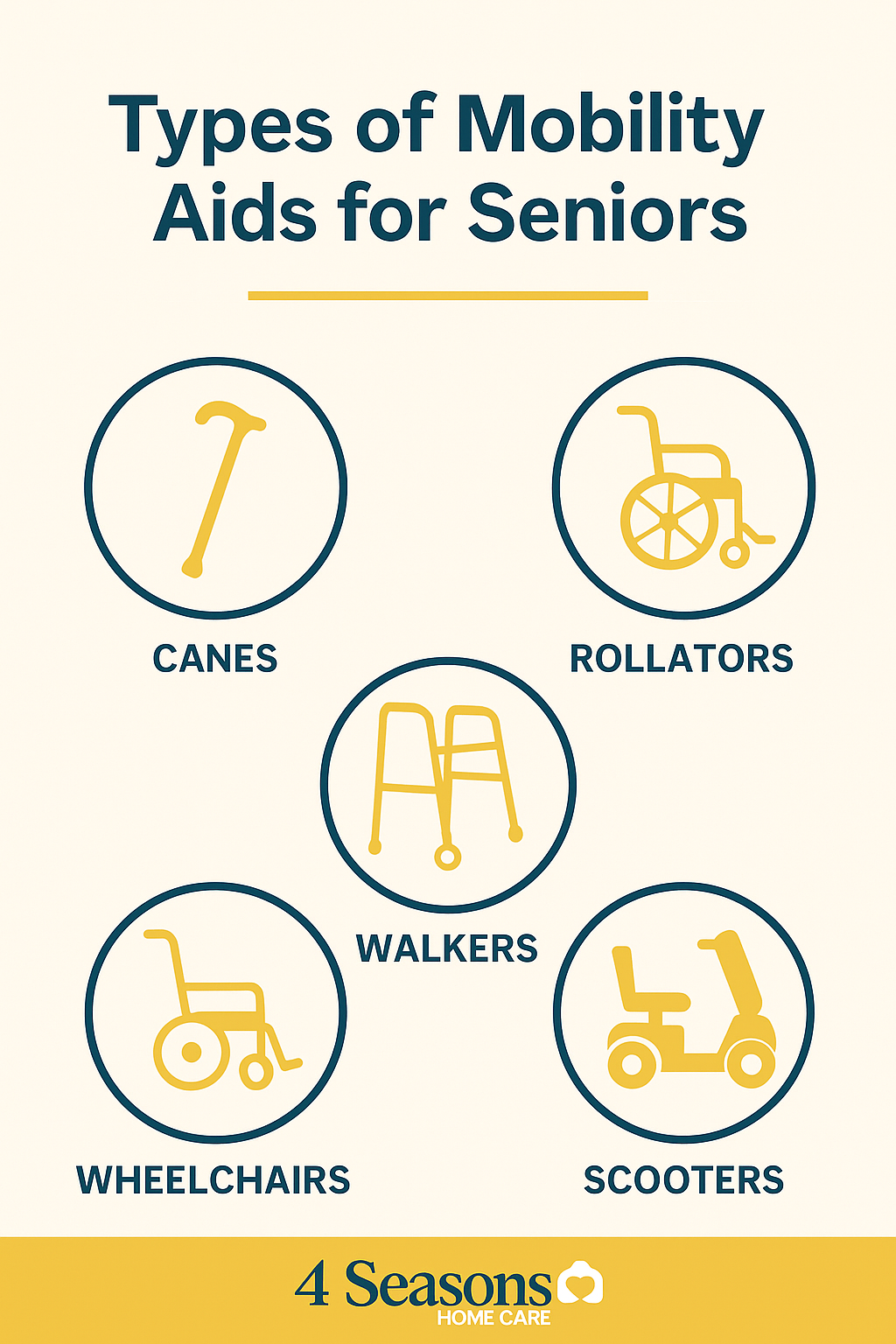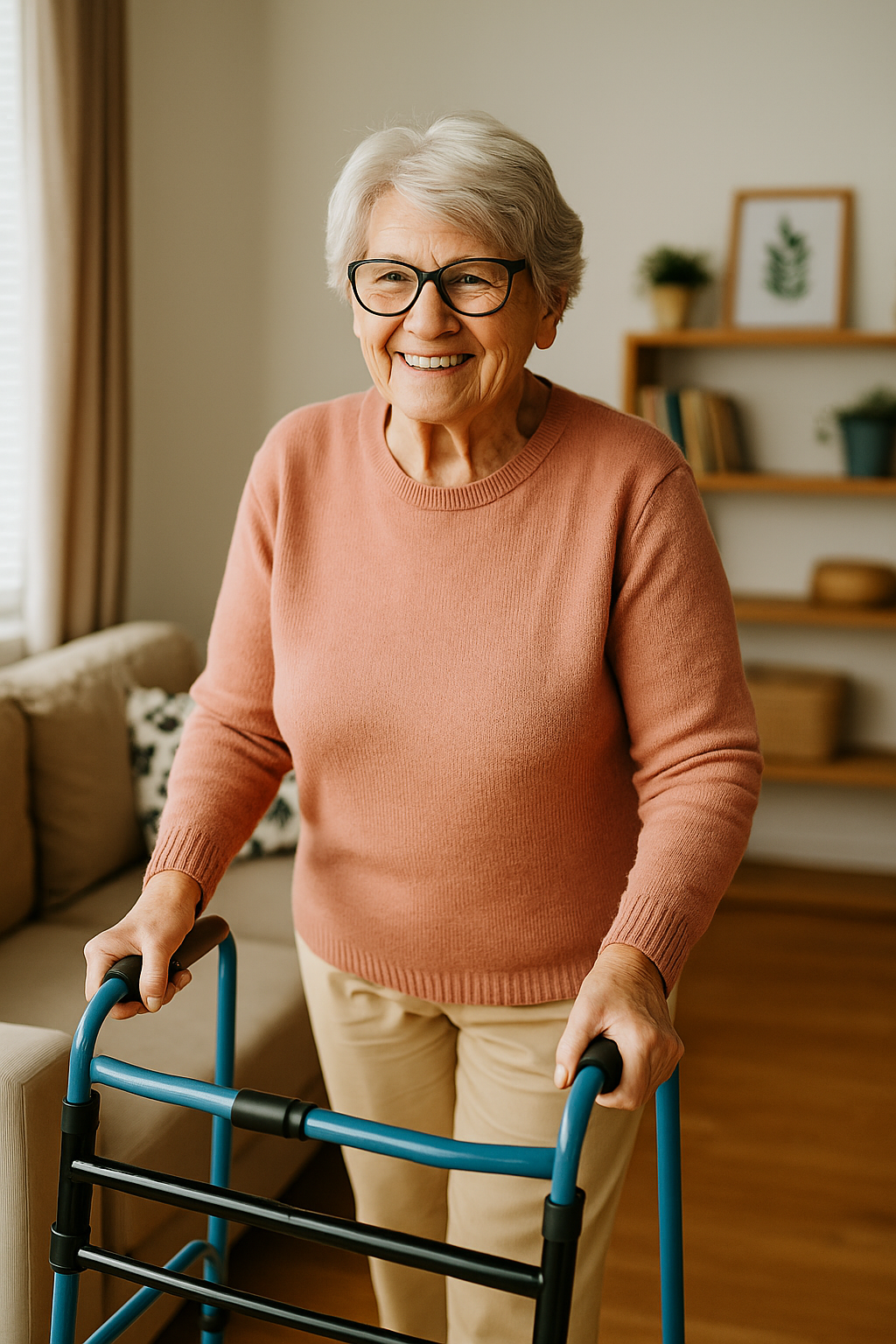Choosing the Right Mobility Aids for Seniors at Home
If you're helping a parent or loved one navigate mobility challenges, you're not alone. At 4 Seasons Home Care, we work with families across Atlanta, Georgia who are navigating this exact decision. From walkers to scooters to simple canes, there's a lot to consider—and we're here to help you make sense of it all. Let's dive in!
Table of Contents
Why Mobility Aids Matter
As our loved ones age, even the simplest daily tasks—getting to the bathroom, answering the door, preparing a meal—can become harder. A properly chosen mobility device helps reduce fall risk, increase independence, and preserve dignity. But not all devices are created equal, and choosing the wrong one can do more harm than good.
Types of Mobility Aids for Seniors

Canes
Lightweight and affordable, canes are a good choice for seniors with minor balance issues. Quad canes offer more stability than standard single-point models.
Walkers
Traditional walkers provide four points of support. Some have wheels (two- or four-wheeled) and some don't. Wheeled walkers are easier to maneuver, but may be harder to control for those with balance concerns.
Rollators
Rollators are walkers with wheels, hand brakes, and built-in seats. They're great for seniors who get tired easily or want to take breaks while walking. They also often include a basket or pouch for personal items.
Wheelchairs
Manual or powered, wheelchairs are essential for those who cannot walk or tire very quickly. Manual chairs require upper body strength or assistance. Powered models allow more independence but are pricier and heavier.
Mobility Scooters
Scooters are popular for outdoor errands or shopping trips. They work well on different terrain but may be too bulky for small homes. Ideal for seniors who still want some autonomy but don't walk well over distances.
Mobility Aids Comparison Table
| Device | Best For | Indoor Use | Outdoor Use | Cost Range |
|---|---|---|---|---|
| Standard Cane | Mild balance issues | ✓ | ✓ | $15 - $25 |
| Quad Cane | Extra stability for mild issues | ✓ | ✓ | $20 - $40 |
| Basic Walker | Moderate mobility loss | ✓ | ✓ (flat surfaces) | $30 - $100 |
| Rollator | Balance support with frequent rests | ✓ | ✓ | $80 - $250 |
| Wheelchair (Manual) | Little to no walking ability | ✓ | ✓ | $150 - $500 |
| Wheelchair (Powered) | No walking ability + independence | ✓ | ✓ | $1,000 - $4,000 |
| Scooter | Outdoor independence | ✗ | ✓ | $800 - $3,000 |
How to Assess Your Loved One's Needs
The best place to start is with a conversation—with your loved one and with their doctor. Ask questions like:
- Are they having trouble standing up or walking short distances?
- Do they experience frequent dizziness or falls?
- Do they want to walk more, but feel unsafe?
- Is their home mobility-friendly (e.g., wide doorways, no stairs)?
In some cases, a physical therapist or occupational therapist can conduct a mobility assessment and recommend the best device.

Costs and Insurance Considerations
Medicare may cover mobility aids if they're deemed medically necessary. To qualify, your doctor must write a prescription, and you'll likely need to go through an approved supplier. Private insurance may have similar guidelines.
If you're paying out of pocket, be realistic about budget and daily use. While rollators are more expensive than canes, they may save money long term by reducing fall risk and hospital visits.
FAQs
Do I need a doctor's prescription for a cane or walker?
Not if you're paying out of pocket. But if you want Medicare or insurance to cover the cost, yes—you'll need a doctor's note.
What's the difference between a walker and a rollator?
A walker typically has no wheels (or only two). A rollator has four wheels, brakes, and a seat. Rollators are better for outdoor use and seniors who get tired easily.
Can caregivers help with mobility aid training?
Yes! At 4 Seasons, our caregivers can reinforce what physical therapists teach and help make sure seniors use their devices safely and confidently at home.
Need Help Choosing? 4 Seasons Can Help
If you're not sure which mobility device makes the most sense, or just want support keeping your loved one safe, reach out to our team. We're local, we're family-focused, and we're ready to walk this journey with you: one step at a time!
